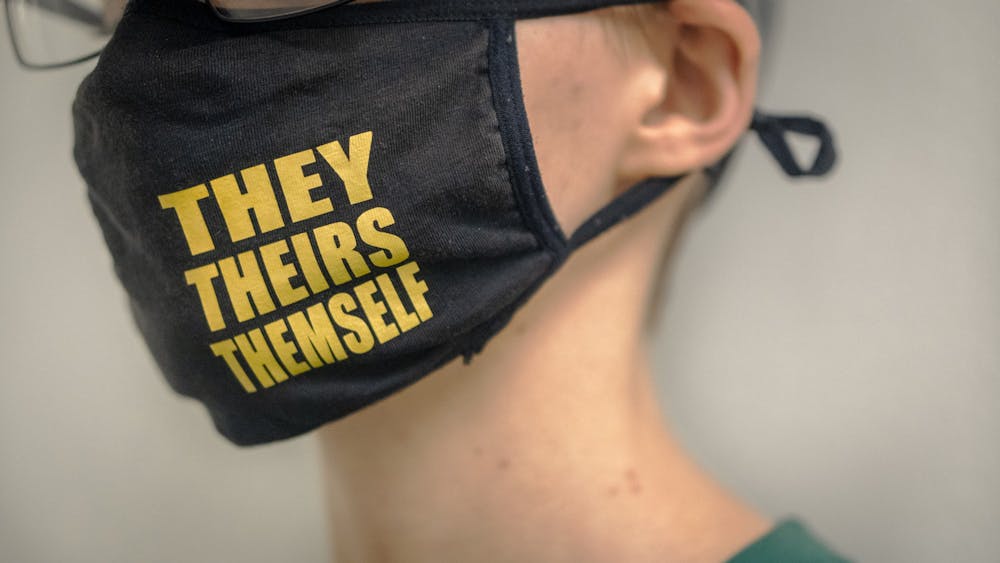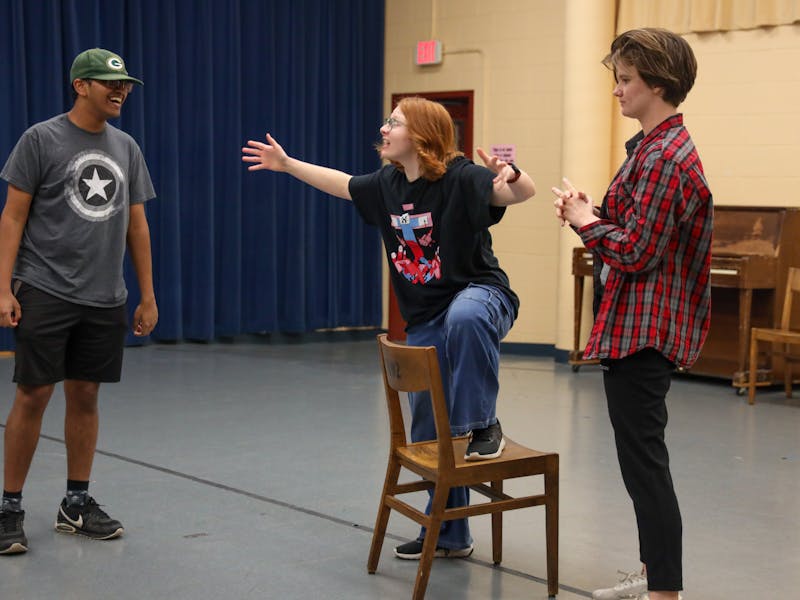When you go on social media nowadays, you might see a new addition to users' profiles. On Instagram, it's now an option to put pronouns next to your profile name for everyone to see. To a cisgender person (someone who identifies as the sex they were assigned at birth), they may not understand why putting your pronouns in your bio is important. However, to people who are transgender or non-binary, it’s a lot more significant than many others would think. In LGBTQ+ spaces, it's become just as important to introduce your pronouns as it is your own name. It's necessary to understand why the normalization of pronouns is happening and why cisgender people have to do it, too.
Upon first meeting, it takes only a glance for people to assume each other’s gender. Assuming can not only be harmful, but also invalidating to people who identify differently from that first assumption. Gender has become a controversial topic among conversations in 2021, and for the most part, is uncomfortable to discuss. The first step to making gender a topic that everyone can talk about is to start with asking each other, “what are your pronouns?” With this question, people can begin to respect each other with the understanding of what their respective gender identities are.
Three LGBTQ+ USC students have continued this conversation for years, and were able to share their insight on their experience with gender and talk about how they express themselves in their everyday lives.

Name: Zen, Zenith or Em
Year: Junior
Pronouns: They/Them
Gender Identity: Non-binary
How old were you when you started questioning your sexual or gender identity? How was that experience for you?
Zen: For my sexual orientation, I wanna say I was 15 or 16 and for my gender identity I was 17. I felt I was probably non-binary but I was too afraid to do anything about it because I didn’t think anybody would recognize me and use my correct pronouns. When I was a four year old child I was saying things like, “Mommy, I’m a tomboy,” and my mom would say, “no, you’re not.” She didn’t even want me to say tomboy; she would always tell me, “you have plenty of feminine interests. You are a lady,” and I would think, “that’s not me.” So, growing up I knew I was a tomboy, and it wasn’t until I met someone who was non-binary that I was like, “wait, that’s a thing?” and made me realize that was me.
How do you express your gender identity? For example, is it through the clothes you wear? The way you act? The things you do?
Zen: Definitely a lot with my clothing, but it’s always very hard for me to find a nice androgynous balance. I tend to lean masculine to try to pass as just 'not a woman,' but it’s very hard to pass as an androgynous, non-binary person, because people always want to put you in one box or the other (male or female) or just take a guess if they can’t tell. I also bind my chest to help with that. The other way I express myself is to let people know my pronouns as often as I can. I put it in parentheses beside my name, when I introduce myself I say my pronouns, my mask has my pronouns — I try to put them out there so I don’t get misgendered.
Do you think that coming to college has allowed you to express your identity more openly? Are the people around you accepting of your identity?
Zen: Yes. I come from a very conservative home and my parents are hyper-conservative, so being here, four hours away from my home and able to be myself is so nice. They misgender me and call me the wrong name, it’s a stressful time. I came out to them as a trans-man because I thought they would be able to understand that better, but they didn’t appreciate it. The only reason I came out to them was because they kept asking and asking until one day I told them, because what are they gonna do about it? Nothing. Despite that, though, my friend group is very supportive of me, and sometimes cisgender people will come up to me on campus and compliment my mask with my pronouns on it.
What does gender mean to you?
Zen: Gender is a very interesting topic. It’s not just the box society puts people in, it’s more than that. The most simplified role society can place on a person is either nurturing or protective and boxes like that, trying to divide a whole population of people, just doesn’t work. There’s no one person dictating the rules of gender.
What would you like to say to those who are questioning their sexual or gender identity? What advice would you like to give them?
Zen: I wanna say to them it’s okay to explore, it’s totally fine. Feel free to try different things and you don’t have to commit to one thing, you can realize later that one identity doesn’t fit you, but another one does. I started out thinking I was asexual, but then realized that wasn’t correct. Gender is fluid, you can change.

Name: Megan
Year: Junior
Pronouns: They/them
Gender Identity: Non-binary
How old were you when you started questioning your sexual or gender identity? How was that experience for you?
Megan: For sexual orientation, it was probably in eighth or ninth grade, and for my gender identity, I was seventeen or eighteen. I feel like it wasn’t necessarily “scary,” it was just like, “Oh, that makes sense.” It was scary at the start, but then I found a label for it, and it wasn’t scary anymore.
How do you express your gender identity? For example, is it through the clothes you wear? The way you act? The things you do?
Megan: I feel as though a lot of it is through clothing. It varies by the day, because I feel like there’s times where I dress androgynously, and if you were to pick me out of a crowd someone would say, “oh, there’s the non-binary one!” Then there’s days where I dress more femme and no one would even think I was non-binary. I wouldn’t say I act masculine or feminine, but I act non-binary. Basically: I do whatever the heck I want.
Do you think that coming to college has allowed you to express your identity more openly? Are the people around you accepting of your identity?
Megan: Oh definitely, 100%. My parents don’t really care about what I do, but the high school I came from was really small, southern, and everyone knew each other. It wasn’t a good environment. I feel like everyone around me is pretty accepting of it, especially people I didn’t think would accept it. The worst I got from it, luckily, is just people who say, “I don’t understand what that means!” and having to explain it 800 times.
What does gender mean to you?
Megan: I feel like it’s just another label. It’s just a check box on a piece paper that I’m checking off for another person, it’s an expectation from people that you pick either “male or female.” I don’t like the box, it’s too crowded in the box. Gender is too big of a spectrum to be putting people in boxes.
What would you like to say to those who are questioning their sexual or gender identity? What advice would you like to give them?
Megan: Express yourself and try whatever you want. If you like it, you like it! If you’re in the guy section of any clothing store and you think, “wow, I really like that shirt!” then get it, go buy it! If you get serotonin from how the shirt looks on you, then maybe look into that, figure it out.

Name: Dillon
Year: Junior
Pronouns: He/him
Gender identity: Transgender Male
How old were you when you started questioning your sexual or gender identity? How was that experience for you?
Dillon: I started questioning my sexual orientation when I was 13, and I didn’t start questioning my gender identity until I was 18, and I’m 19 now. When I was figuring out my sexual orientation, it had been an ongoing challenge because I had been using the wrong “pieces,” so when I figured out my gender identity that helped me come to a more concrete answer on what my sexuality was.
How do you express your gender identity? For example, is it through the clothes you wear? The way you act? The things you do?
Dillon: I just try to be myself, and the way that’s interpreted, I hope that’s the way I want. The ways I consciously express my gender identity is to look at guys who I find vaguely attractive and see what I find attractive about them so I can obtain it for myself. So that’s why when I first started transitioning I wore a lot of "frat boy" clothes. The days when I feel gender euphoria are the days when I look like a frat guy.
Do you think that coming to college has allowed you to express your identity more openly? Are the people around you accepting of your identity?
Dillion: Well, in high school I had other friends within the LGBT+ community so I was already comfortable with my identity. People in my life currently are very accepting of my identity. I’m fully out to my parents, my grandparents and even to my super-religious grandma.
What does gender mean to you?
Dillon: For me, gender is how I perceive myself. And again, how I hope others perceive me. It’s how I hold myself to certain standards to make me feel in alignment with who I feel I am.
What would you like to say to those who are questioning their sexual or gender identity? What advice would you like to give them?
Dillon: Have a lot of patience with yourself and others. You won’t find any of the answers in one night or in one Google search. Your sense of self will evolve, and to appreciate yourself as you figure things out.
Everyone’s experience with gender and sexuality is different — there’s no right or wrong way to figure things out. If it’s scary or confusing, just know there is someone who is going through the same struggle. Dressing however you want, expressing either your feminine side, masculine side or even both, is validating in more ways than a lot of people can imagine. When someone who has struggled with their gender identity is addressed with the correct pronouns, the gender euphoria they feel is why it's important to normalize the question in everyday life. All it takes is for someone to ask, “What are your pronouns?”



